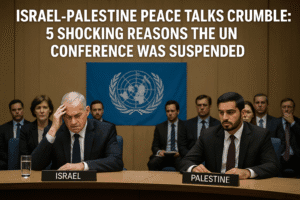Israel-Palestine Peace Talks Crumble: 5 Shocking Reasons the UN Conference Was Suspended
A critical UN conference co-hosted by Saudi Arabia and France, aimed at reviving the dormant Israeli-Palestinian peace process through a two-state solution, has been abruptly suspended. The sudden escalation of direct military strikes between Israel and Iran, involving attacks on nuclear facilities and ballistic missile barrages, forced the postponement. Regional leaders essential for meaningful talks became unable to attend the scheduled June 17th meeting in New York due to the crisis.
The suspension deals a harsh blow to Palestinian aspirations for self-determination, once again sidelined as collateral damage in a broader regional conflict. It also squanders hard-won diplomatic momentum and risks deepening cynicism about peace prospects. While Saudi Arabia and France vow to reconvene “at the earliest possible date,” the delay starkly exposes how interconnected regional tensions actively sabotage dedicated efforts to resolve the core Israeli-Palestinian conflict. The path to peace remains contingent not just on political will, but on a stable environment currently engulfed by violence. This suspension dims a fragile flicker of hope for negotiated settlement.

Israel-Palestine Peace Talks Crumble: 5 Shocking Reasons the UN Conference Was Suspended
The fragile embers of renewed Israeli-Palestinian peace talks have been abruptly smothered by the raging fires of regional conflict. A critical United Nations conference, co-hosted by Saudi Arabia and France and focused squarely on reviving the dormant “two-state solution,” has been suspended indefinitely. The reason? The dangerous escalation between Israel and Iran, culminating in unprecedented direct strikes, has made high-level regional diplomacy impossible – for now.
More Than Just a Postponement
Scheduled for June 17th at the UN headquarters in New York, the “High-Level Conference for the Peaceful Settlement of the Question of Palestine” represented a significant, if cautious, step. Saudi Arabia’s prominent role as co-host was particularly noteworthy, hinting at Riyadh’s potential willingness to engage in normalization processes contingent on tangible progress for the Palestinians. France’s involvement underscored continued European diplomatic investment.
However, the carefully laid plans unraveled swiftly following the dramatic exchange of attacks. Israel’s strikes targeting Iranian nuclear and military facilities, reportedly resulting in high-level casualties, and Iran’s retaliatory ballistic missile barrage created an immediate crisis atmosphere. Regional leaders, essential participants for any meaningful dialogue, found themselves unable to disengage from urgent security matters at home.
A Statement of Grim Reality
The joint declaration from the Saudi and French UN missions was blunt: “due to the current circumstances in the Middle East that prevent regional leaders from attending… we will only open the meeting and proceed to propose the suspension of the Conference.” This isn’t mere scheduling conflict; it’s a stark admission that the political oxygen needed for peace talks has been consumed by the fires of warfare.
The Human and Diplomatic Cost
The suspension carries a heavy, unspoken cost:
- Palestinians in the Crossfire: Once again, the aspirations of Palestinians for self-determination are sidelined, victims of a broader regional power struggle they cannot control. The immediate crisis diverts global attention and resources away from their plight.
- Squandered Momentum: Building consensus for such a high-level conference required significant diplomatic effort. Suspension risks dissipating that hard-won momentum, making it harder to reconvene effectively later.
- Deepening Cynicism: Each delay reinforces the perception among Palestinians and Israelis alike that the international community is either incapable or insufficiently committed to achieving a just peace. It fuels despair and empowers extremists on all sides.
Determination Amidst Setback
Despite the setback, the co-hosts signaled resolve: “We are determined to resume the conference at the earliest possible date.” They will hold a brief opening session on June 17th to formally suspend proceedings, inviting all states to attend – a symbolic gesture to keep the issue on the agenda.
The Unavoidable Truth
This suspension is more than a logistical hiccup; it’s a painful illustration of how interconnected conflicts in the Middle East are. Progress on the Israeli-Palestinian front cannot be insulated from the wider regional landscape. The dangerous escalation between Israel and Iran hasn’t just caused physical damage and loss of life; it has actively sabotaged a dedicated effort to address one of the region’s longest-standing wounds.
The path to Israeli-Palestinian peace remains fraught, demanding immense political courage and a stable regional environment. The suspension of the UN conference is a stark reminder that without de-escalation and a renewed commitment to dialogue across multiple fronts, even well-intentioned diplomatic initiatives stand little chance. The hope for a two-state solution isn’t extinguished, but its flicker has been significantly dimmed, waiting for the regional storm to pass before it can be cautiously rekindled.
You must be logged in to post a comment.